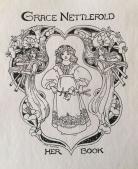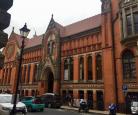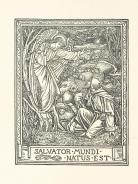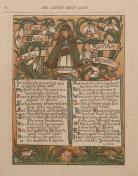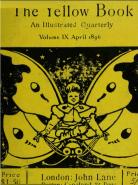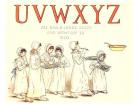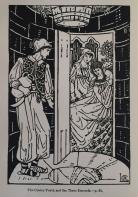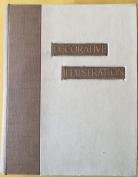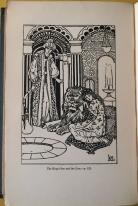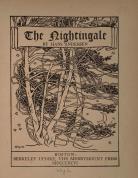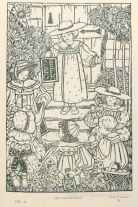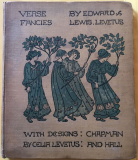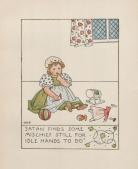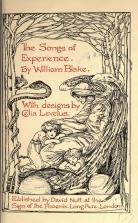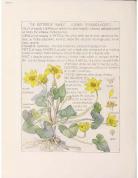Drawn to Books
Created by Rebecca Mitchell on Mon, 02/12/2018 - 11:14
Part of Group:
Timeline to accompany the "Drawn to Books" exhibition, featuring women artists of the Birmingham School.
Timeline
Chronological table
| Date | Event | Created by | Associated Places | |
|---|---|---|---|---|
| 1838 |
Birth of Edward R. Taylor(1838 - 1911) |
George Bandy | ||
| 1845 |
Birth of Walter Crane(1845 - 1915) Crawford, A. (2004-09-23). Crane, Walter (1845–1915), illustrator, designer, and painter. Oxford Dictionary of National Biography. Retrieved 28 Mar. 2018, from http://www.oxforddnb.com/view/10.1093/ref:odnb/9780198614128.001.0001/od.... |
George Bandy | ||
| 1860 |
Birth of Mary Newill(1860 - 1947) |
George Bandy | ||
| 1862 |
Birth of Arthur Gaskin(1862 - 1928) |
George Bandy | ||
| 1863 |
Birth of Harriet Isabel Adams(1863 - 1952) |
George Bandy | ||
| 1866 |
Birth of Georgie Gaskin(1866 - 1934) Crawford, A. (2004-09-23). Gaskin [née France], Georgie Evelyn Cave (1866–1934), designer. Oxford Dictionary of National Biography. Retrieved 28 Mar. 2018, from http://www.oxforddnb.com/view/10.1093/ref:odnb/9780198614128.001.0001/od.... |
George Bandy | ||
| 1874 |
Birth of Celia Levetus(1874 - 1936) |
George Bandy | ||
| 1875 |
Goblin Market, Prince’s Progress & Other PoemsChristina G. Rossetti, illustrated by Dante Gabriel Rossetti Goblin Market, Prince’s Progress & Other Poems (Macmillan, 1875) The Levetus siblings built upon the legacy of an earlier brother and sister collaboration – the Rossettis. ‘Goblin Market’ is Christina Rossetti’s best known poem. When it was first published in 1862, it was considered a children’s moral tale, but modern audiences are often struck by its sexual violence and homoerotic undertones.
|
George Bandy | ||
| circa. 1884 |
Bookplates by Celia LevetusBookplates by Celia Levetus Celia Levetus designed at least twenty-five bookplates, many of which feature a woman reading. At a time when many women received little education, these images challenged prevailing attitudes. John Nettlefold, original owner of Winterbourne, and his sister Grace both had bookplates designed by Celia Levetus.
|
George Bandy | ||
| 1884 |
The Adventures of Philip, Volume IWilliam Makepeace Thackeray The Adventures of Philip, Volume I (Smith, Elder & Co., 1884) This book belonged to John Nettlefold of Winterbourne, and carries the bookplate designed for him by Celia Levetus. John’s wife Margaret attended classes at the Birmingham School of Art in the 1890s and may have met Levetus there.
|
George Bandy | ||
| circa. 1885 |
Apple Pie
Kate Greenaway Apple Pie (George Routledge & Sons, mid-1880s) Kate Greenaway(1846-1901) was a prolific writer and illustrator of children’s books, and her style inspired many of the Birmingham School artists. Greenaway studied at the Royal Female School of Art and the Slade School of Fine Art. The Regency-style dresses depicted by Greenaway influenced Arts and Crafts fashion for middle-class children in the late 19th century. |
George Bandy | ||
| 1885 |
Birmingham School of ArtThe Birmingham School of Art, England's first Municipal School of Art, opened in 1885 in a Victorian Gothic building designed by John Henry Chamberlain. Under the guidance of founding Director of Edward R. Taylor, it became an important site of Arts and Crafts design. |
Rebecca Mitchell |
|
|
| 1889 |
Arts and Crafts Exhibition - 1889Featuring lectures by: Featuring Work by: |
George Bandy | ||
| 1893 |
A Book of Pictured Carols
Designed under the direction of Arthur J. Gaskin (George Allen, 1893) A Book of Pictured Carols
Arthur Gaskin was an instructor at the Birmingham School, and this volume was produced by his students. The title page border was designed by Georgie Cave (later Georgie Gaskin) and cut in wood by Mildred Peacock. ‘Salvator Mundi’ was by another Birmingham School student, Florence Rutland. A letter from Gaskin to John Thackray Bunce—editor of the Birmingham Daily Post and father of artists Kate and Myra Bunce—is tipped into the copy. |
George Bandy | ||
| 1893 |
Arts and Crafts Exhibition - 1893Featuring Lectures by: Featuring Work by: |
George Bandy | ||
| 1893 |
The Little Grey LadyIllustrated by Georgie Gaskin The Little Grey Lady (Society for Promoting Christian Knowledge, 1893) The snowdrops in Gaskin’s illustration allude to the answer to the ‘spring riddle’, and the baby animals are mentioned in the poem: ‘…the goslins / the ducklets & chicks / …the dear lambs…’. Gaskin was a woman of many talents. She was also a prolific designer of Arts and Crafts jewellery. |
George Bandy | ||
| 1894 to 1896 |
The QuestThe Quest, Volumes I-II (Cornish Brothers, 1894-96) As the official magazine of the Birmingham School of Art, ‘The Quest’ (1894-96) prominently featured the work of instructors and former students. The headpiece for ‘The Art of Prose’, designed by Celia Levetus, is far more charming than the turgid prose of the article.
|
George Bandy | ||
| 1894 to 1897 |
The Yellow BookThe Yellow Book, Volume IX (Elkin Matthews & John Lane, 1896)
Published between 1894 and 1897, ‘The Yellow Book’ promoted the ‘Aesthetic’ and ‘Decadent’ styles. The April 1896 volume [displayed] featured an impressive array of women of the Birmingham School, including Celia Levetus, Georgie Gaskin, H. Isabel Adams, and Mary Newill.
|
George Bandy | ||
| 21 Feb 1894 |
William Morris' Lecture to Graduates of the Birmingham Municipal School of Art |
George Bandy | ||
| 1895 |
ABC an AlphabetWritten and pictured by Mrs Arthur Gaskin ABC An Alphabet (Elkin Matthews, 1895) These woodcuts by Georgie Gaskin (1866-1934) encpasulate some favourite themes of the Birmingham School: realistic portrayal of nature, pastoral living, and mediaevalism. Woodcuts were popular with Arts and Crafts artists, because they linked mediaeval techniques with modern industry. Gaskin was also inspired by Kate Greenaway’s images of children. |
George Bandy | ||
| 1895 |
Fairbrass: A Children's StoryT. Edgar Pemberton, illustrated by Kate E. Bunce Fairbrass: A Children’s Story (Cornish Brothers, 1895)
Painter and illustrator Kate Elizabeth Bunce (1856-1927) was trained, along with her sister Myra, at the Birmingham School of Art. Her father John Thackray Bunce was an early supporter of the school and of the municipal museum (now the Birmingham Museum and Art Gallery). The working proof shows Bunce’s sketch for the illustrated initial, visible in its final state in the published volume.
|
George Bandy | ||
| 1895 |
A Book of Nursery Songs and RhymesS. Baring-Gould (ed.), illustrated by members of the Birmingham Art School under the direction of A. J. Gaskin A Book of Nursery Songs and Rhymes (Methuen, 1895) Arthur Gaskin, an instructor at the Birmingham School of Art, oversaw publications that drew on the talents of his students. Celia Levetus’s ‘Goosey, Goosey, Gander’ is typical of the Birmingham School, while ‘Little Jack Horner’ reflects the new ‘Decadent’ style, influenced by artists such as Aubrey Beardsley. |
George Bandy | ||
| 1896 |
Arts and Crafts Exhibition - 1896Featuring Lectures by: Featuring Work by: |
George Bandy | ||
| circa. 1896 |
The Cinder YouthCelia Levetus In this pen and ink study for Turkish Fairy Tales, Levetus demonstrates her adept use of 'saturated' black. While the flattened space recalls the Pre-Raphaelites, Levetus has also been influenced by the 'Aesthetic' and 'Decadent' movements, particularly the stark, dramatic use of black in Aubrey Beardsley's illustrations. |
George Bandy | ||
| 1896 |
Of the Decorative Illustration of Books Old and NewWalter Crane Of the Decorative Illustration of Books Old and New (George Bell and Sons, 1896) Walter Crane was a renowned artist and illustrator, who lectured at the Birmingham school and championed the work of its students. Here, Crane praises Mary Newill’s works for their ‘ornamental rendering of natural landscapes’, perfectly demonstrated in her idyllic pen and ink drawing of the Somerset village of Porlock. Mary Newill (1860–1947), who also designed textiles, studied and later taught at the Birmingham School.
|
George Bandy | ||
| 1896 |
Turkish Fairy Tales and Folk Tales - 'The Wind-Demon'Collected by Dr. Ignácz Kunos, translated from Hungarian by R. Nisbet Bain, illustrated by Celia Levetus Turkish Fairy Tales and Folk Tales (Lawrence & Bullen, 1896) This image illustrates a story called ‘The Wind-Demon’. Levetus’s quaint designs for the siblings’ clothing and the palace’s lavish interior décor are similar to those seen in fairytale illustrations by Birmingham School lecturer Walter Crane. They reflect late-Victorian stereotypes of the Middle East. |
George Bandy | ||
| 1896 |
The NightingaleHans Christian Andersen, illustrated by Mary J. Newill The Nightingale (Napier, 1896) Mary Newill presents an exotic interpretation of Andersen’s tale of the Chinese Emperor and his court, which reflects Victorian stereotypes of China. She fuses Pre-Raphaelite traditions, such as flatness and detailed depiction of natural scenery, with a folk-art style typical of the Arts and Crafts movement. |
George Bandy | ||
| 1897 |
History of the Horn-Book, Volume IIAndrew White Tuer History of the Horn-Book, Volume II (Leadenhall Press, 1897) This richly illustrated volume contains a space for storing ‘horn books’. These educational tools had been used to teach reading from mediaeval times. The striking purple ‘battledore’ horn book, embossed in gold on its highly-coloured back, features a comical poem bordering the main content. The illustrators include Birmingham School artists Georgie Cave France (later Gaskin), C. M. Gere and Celia Levetus, whose image ‘Taskmistress’ won an award.
|
George Bandy | ||
| 1897 |
Verse FanciesPoems by Edward Levetus, illustrations by Celia Levetus Verse Fancies (Chapman & Hall, 1899) This collection was created by the brother and sister duo, Edward and Celia Levetus. ‘Love in Ambush’ depicts a typically English scene, with luscious rose bushes and dense foliage in the background. The peacock adds a contemporary twist – peacocks often appear in the work of ‘Aesthetic’ artists such as Aubrey Beardsley. |
George Bandy | ||
| 1898 |
A Tale of Six Little TravellersMrs. Arthur Gaskin A Tale of Six Little Travellers (H. R. Allenson, 1898) Georgina Gaskin (1866-1934) was critically acclaimed for her skill in drawing children. She typically portrayed them with rosy cheeks, smock-like clothing and fleshy faces. Their innocent appearance appealed to popular taste, making Gaskin a commercial success.
|
George Bandy | ||
| circa. 1898 |
SybilPoem by Edward Levetus, illustrated by Celia Levetus Sybil Verse and illustration, two of the foremost interests of the Pre-Raphaelites, are brought together in the work of brother and sister Celia and Edward Levetus. The siblings combine their respective talents as poet and artist, and the result is more than the sum of its parts.
|
George Bandy | ||
| 1899 |
Arts and Crafts Exhibition - 1899Featuring Lectures by: Featuring Work by: |
George Bandy | ||
| 1899 |
Songs of InnocenceWilliam Blake, with designs by Celia Levetus (Wells, Gardner, Darton & Co., 1899) Songs of Innocence The ‘Songs of Innocence’ were first published in 1789, with Blake’s own dark and sinister etchings. In this tiny edition, Celia Levetus provides a new, and gentler, set of illustrations. Blake’s nineteen original poems are spread over 118 mini-pages. Celia Levetus (1874-1936) attended the Birmingham School of Art in the 1890s and rapidly gained a reputation as one of its most prolific artists. |
George Bandy | ||
| 1901 |
Divine and Moral SongsRev. Isaac Watts, illustrated by Mrs. Arthur Gaskin Divine and Moral Songs (Elkin Matthews, 1901) Georgie Gaskin’s colour illustrations bring new life to this enduring religious ‘manual’ for children, which was first published in 1715. Her simple line drawings and subtle use of colour are reminiscent of Kate Greenaway’s work, and were more accessible than earlier 19th-century illustrations. Gaskin’s delicate and naïve style appealed to late Victorian taste. |
George Bandy | ||
| 1902 |
Songs of ExperienceWilliam Blake, with designs by Celia Levetus Songs of Experience (Nutt, 1902) In contrast to her work in Blake’s ‘Songs of Innocence’, here Levetus introduces a more unsettling and menacing undertone, echoing the uneasiness in the poems (first published in 1794). Bare, spindly branches wrap around the image, creating a claustrophobic atmosphere. The snake, a symbol of Satan, looms threateningly on the left, while the winged woman to the right seems to be protecting the two frightened children at her feet. |
George Bandy | ||
| 1903 |
Arts and Crafts Exhibition - 1903Featuring Work by: |
George Bandy | ||
| 1907 to 1910 |
Wild flowers of the British Islands, Volume 1Written and illustrated by H. Isabel Adams Wild flowers of the British Islands, Volume I (Heinemann, 1907-10) This book reminds us of the role women played in the sciences during the late 19th and early 20th centuries. In contrast to the preference for black and white among Birmingham School artists, Isabel Adams uses colour. Employing her keen powers of observation and attention to detail, she creates highly realistic images of plant anatomy for her audience. |
George Bandy | ||
| 1928 |
Arts and Crafts Exhibition - 1928Featuring Work by: |
George Bandy |

